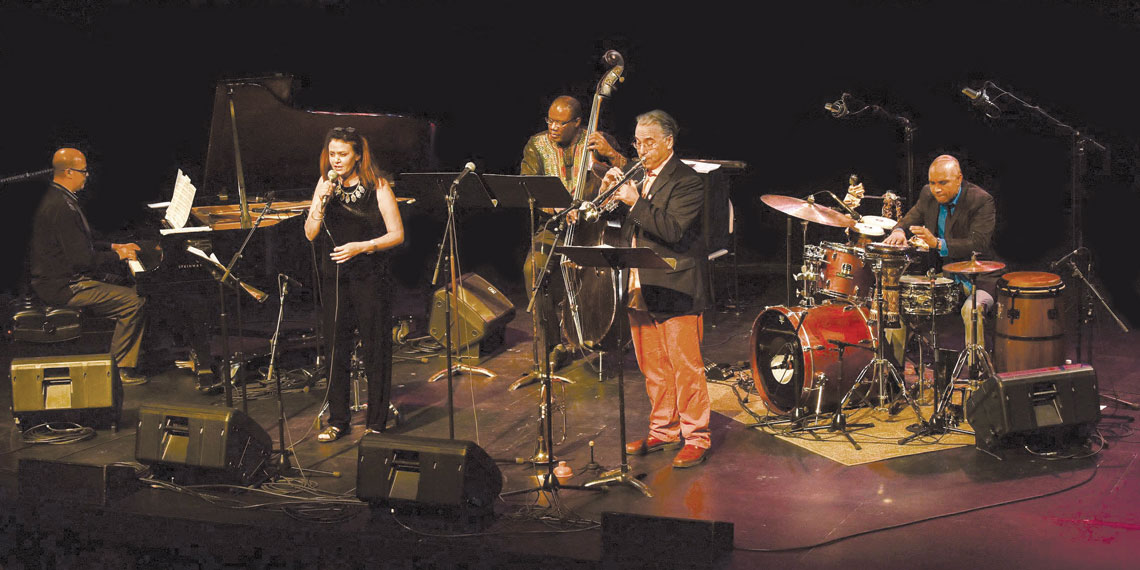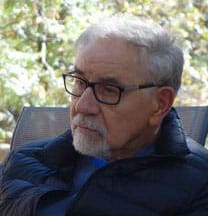 Odessa/Havana features Hilario Duran on piano, David Buchbinder on trumpet and singer Maryem Hassan Tollar. Photo from Facebook
Odessa/Havana features Hilario Duran on piano, David Buchbinder on trumpet and singer Maryem Hassan Tollar. Photo from Facebook
Remembered for its spellbinding performance at the Skirball Cultural Center 10 years ago, David Buchbinder’s Odessa/Havana ensemble will return with its blend of Jewish and Cuban music on Aug. 24 as part of the center’s Sunset Concert series. And it’s coming with a big change.
The group — formed in Toronto in 2006 by Buchbinder, an award-winning klezmer trumpeter and composer, and Cuban Hilario Duran, a Grammy-nominated jazz pianist — has added Maryem Hassan Tollar, an Egyptian-born singer, to broaden its repertoire.
“I decided to add a singer partly because our music is pretty intense and sometimes abstract,” Buchbinder said, “and it was really clear that having a singer would not only help us connect with audiences but also help us connect with ancient Ladino traditional songs.”
Ladino is the Judeo-Spanish language that Sephardic Jews took with them when they were exiled from Iberia more than 500 years ago.
“Ladino songs are the Jewish music of Andalusia,” Buchbinder said, “so they bring together the Jewish and the Cuban, since Andalusia is the root of both Jewish music and Cuban music. So to actually have a vocal repertoire to draw on, and to re-create it with our own imagination the way we do with everything, really brought a rich, new element into our sound.”
Adding a vocalist is a crucial change for Odessa/Havana, which a decade ago drew an enthusiastic response from a Skirball audience that urged the group to play encore after encore. The song “Cadiz,” for example — offered in its entirety on the Skirball website — is an entrancing piece composed by Buchbinder with Tollar vocalizing without words, almost like a liturgical chant, so that her voice becomes a haunting musical element, weaving in and out with the piano, violin, trumpet, bass, sax and percussion.
Buchbinder described Tollar’s vocal style, even when she sings lyrics, as having a quality of “otherworldliness” that blends with the instruments.
“Cadiz” references the city of that name in southwestern Spain where a blend of ethnic and religious influences once created a mother lode of culture, Buchbinder said. “The Andalusia area, during the medieval period, was an amazing time in history,” he said. “There was innovation and advancement in everything that makes us human, from science and medicine to food [and] philosophy.”
According to Buchbinder, Cadiz and other Andalusian hubs spawned many musical strains that have common elements, including Roma, Arabic, Cuban, Ladino and North African. “Even klezmer came from there,” he said. “After the expulsion of Jews [from Spain and Portugal], some went to Eastern Europe, so that the Andalusian musical stream flowed into Yiddish culture as well.”
Those Andalusian melodic and rhythmic traditions are threaded deeply into Odessa/Havana’s music, all of which is composed by either Buchbinder or Duran.
“Hilario and I each write our own pieces,” Buchbinder said, “and once in a while we’ll get together and throw ideas back and forth. But usually we each go and do our own thing. That is still the core of the band, and that makes for something that I think is a really unique experience for an audience, because they recognize all the flavors, if you will. But the particular dish that we’ve created is unique because we’ve created an original sound that comes out of all these different traditions — Afro-Cuban and Jewish musical traditions. So people understand all the musical references, but they’ve never heard them expressed this way before.”
Buchbinder said the group has taken traditional Ladino songs and “reimagined” them, but they’ve also taken more contemporary Ladino poems and set them to music. “It’s very fruitful and enjoyable as a composer to take lyrics that don’t have a melody, lyrics that exist as poetry, and write songs,” he said. “And I’ve done some of that with Odessa/Havana.”
Of course, songs with lyrics would not have been possible without the addition of Tollar’s soulful singing.
In Odessa/Havana’s second album, “A Walk to the Sea” — which won a Juno Award, the Canadian Grammy — Buchbinder set a Ladino poem to music twice.
“I took this Ladino poem called “La Roza” (The Rose) and wrote two completely different musical versions with the idea that I would decide which one to use,” Buchbinder said. “But the band liked both of them so much, and the two versions were so different from each other, that we kept both of them in the album.”
Buchbinder said the group has already recorded its third album, which is still being prepared for release.
“Unfortunately, it won’t be finished when we do the Skirball concert, although we’ll give people an opportunity to purchase an advance copy, which we’ll send to them later,” he said. “In this third record we’ve taken the act of creating a new sound even further, and this is something that people will definitely hear at the concert in L.A., stuff that’s really pushing this kind of new sound.”
Odessa/Havana will perform at the Skirball Cultural Center at 8 p.m. Aug. 24. The concert is free, although RSVPs are no longer being accepted. Walk-up attendees are welcome, with seating on a first-come, first-served basis. Parking is $10, cash only. For more information, visit www.skirball.org.





















 More news and opinions than at a Shabbat dinner, right in your inbox.
More news and opinions than at a Shabbat dinner, right in your inbox.